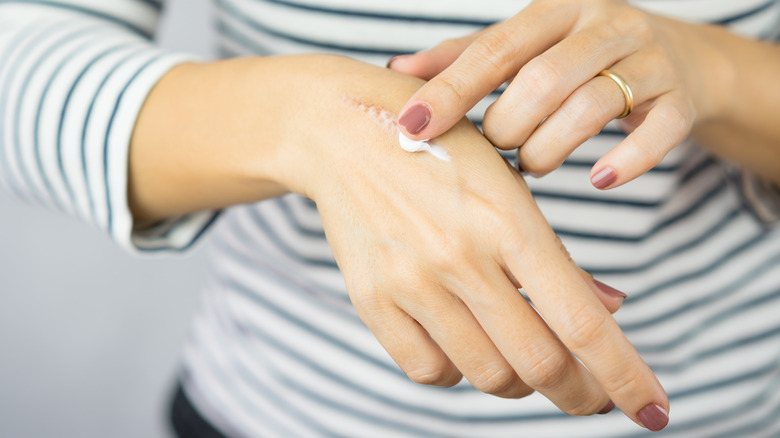Neosporin Or Mederma: Which OTC Scar Remedy Do People Prefer?
Although it might seem simple enough to self-diagnose a scar, experts at the American Academy of Dermatology Association emphasize the importance of having a scar looked at by a doctor. A board-certified dermatologist will not only be able to diagnose and treat the specific kind of scar you have, but they can also determine whether or not your scar will heal and fade in the long run. Professional treatment methods will vary by scar. For example, a dermatologist may utilize pressure therapy for a raised scar, while other types of scars may respond best to laser therapy, corticosteroid injections, or cryosurgery.
When it comes to over-the-counter options for lessening the appearance of a scar, there are many options to choose from. To find out which product readers of Health Digest prefer the most, we surveyed 612 people and asked them to choose their favorite scar remedy between five different options. Between Neosporin and Mederma, here's the product that ultimately won out.
Which topical are people using most?
With the least amount of votes was Bio-Oil with 31 responses. This option made up just over 5% of total answers. Bio-Oil products cater to dry skin, scars, and stretch marks. With roughly twice as many votes, 60 people selected ScarAway as their go-to scar remedy. Accounting for 9.8% of the total votes, these silicone products come in the form of gels, sprays, and sheets (via ScarAway). In third place was tea tree oil with 94 responses, making up 15.36% of the total votes. While Healthline notes that tea tree oil will not aid in the removal of scars, it may help prevent wound-related scarring or subsequent infection.
The top two answers amongst respondents came down to Neosporin and Mederma. With 286 votes, Neosporin proved to be most popular amongst Health Digest readers, compared to 141 votes for Mederma. Ultimately, Neosporin accounted for nearly 50% of all votes. Offering 24-hour protection from infection, Neosporin is designed to relieve itching, pain, and reduce the appearance of scars. All in all, the American Academy of Dermatology Association notes that it's important to see a dermatologist if you notice the development of a scar, in the event that it may potentially be skin cancer.


